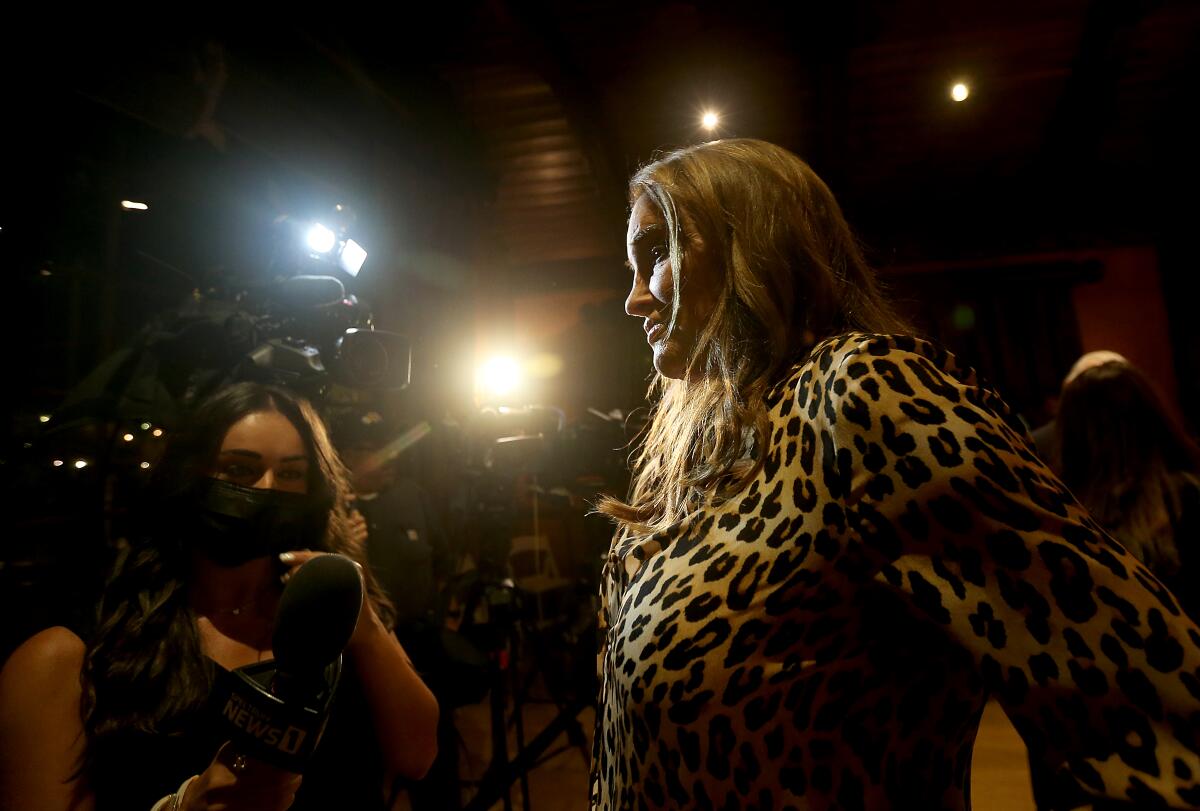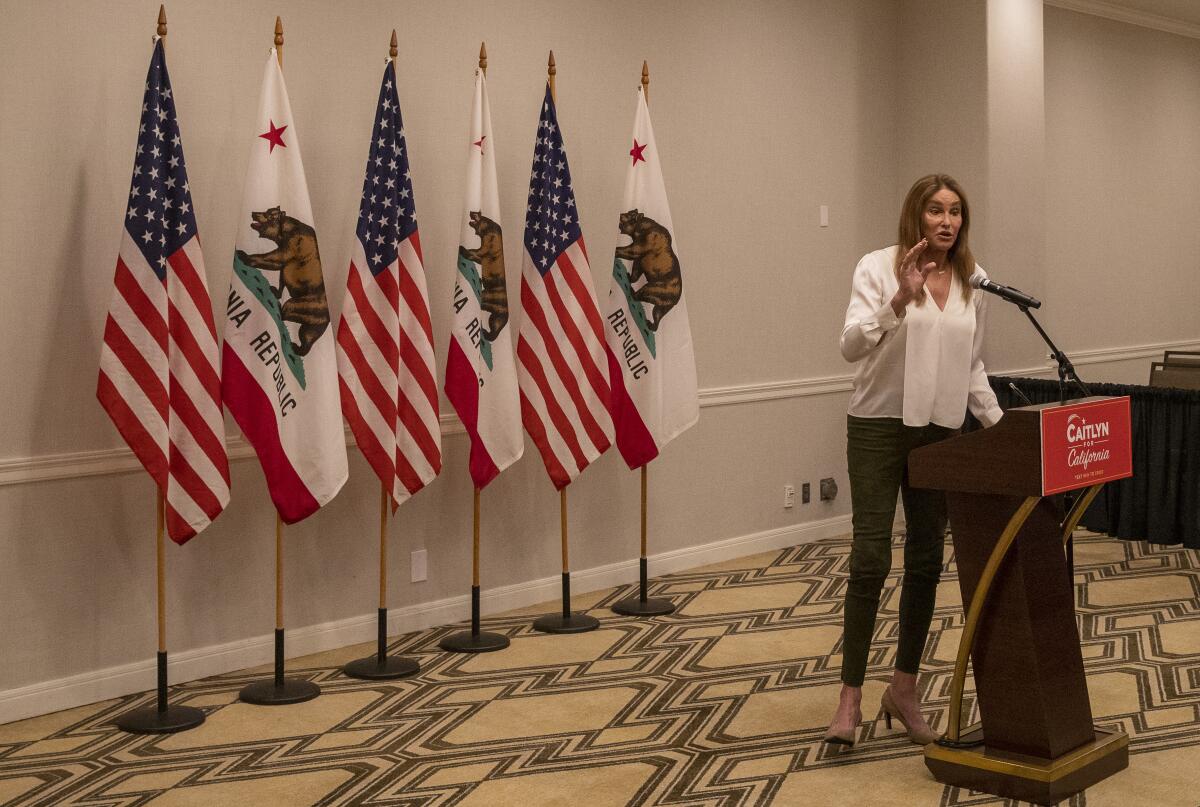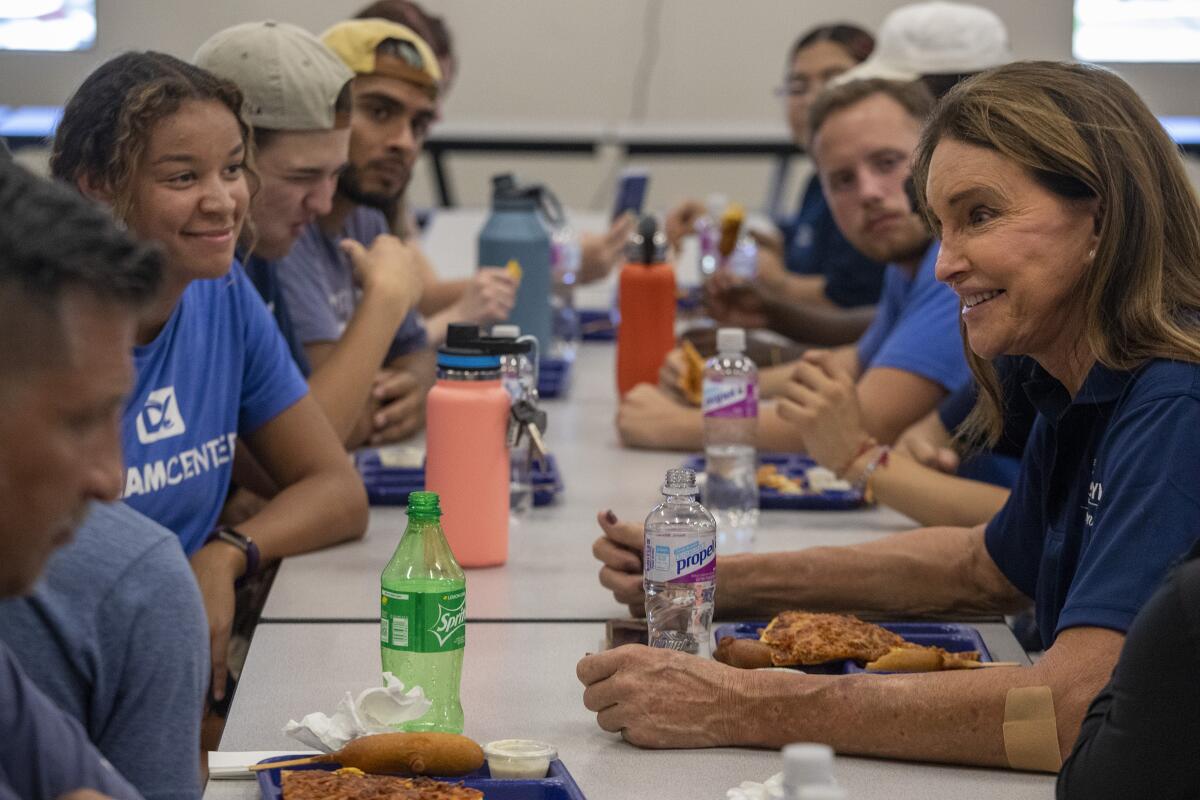Caitlyn Jenner brought fame to her run for California governor. Why it failed anyway

- Share via
Caitlyn Jenner was not embraced by the Republican Party in her bid to replace Gov. Gavin Newsom in the California recall election. She didn’t have the support of the LGBTQ community. Nor did she win the public praise of her famous family members.
But, she noted, she did have something none of the other candidates vying to become governor had.
For the record:
11:23 a.m. Sept. 22, 2021An earlier version of this story stated that consultant Rob Stutzman said former Gov. Arnold Schwarzenegger was “more famous than the pope.” Stutzman said that Schwarzenegger was “the second most famous person in the world after the pope.”
“I can get all the free media in the world,” said Jenner, 71, awash in the glare of flashing cameras at her recall election night party.
In a state with an enduring history of celebrities-turned-politicians, where voters have elevated Hollywood stars to the governorship, Jenner’s history-making entry into politics as a transgender gubernatorial candidate came with instant visibility and interest.
But despite her celebrity as a former Olympic decathlete and member of a family that has become an American pop culture touchstone, Jenner’s fame failed to help her win over voters.
She was spurned by prominent figures in the state GOP and roundly criticized by LGBTQ advocacy groups for her words and actions — or lack of them — as one of the most high-profile transgender people in the world. Her famous daughters Kendall and Kylie Jenner, with nearly 500 million Instagram followers between them, did not appear at her campaign events — Jenner said she told them “not to be involved whatsoever” with her campaign. Her candidacy was plagued with accusations that she wasn’t a serious contender.
And by the end of election night, after Newsom handily won the recall, Jenner had drawn just over 1% support at the polls.
“We were going up against the machine and it looks like the machine won,” she said to a few dozen supporters who had gathered at an upscale wine bar in Westlake Village on election night. “It’s a shame. I love this state. I don’t want to see it go downhill... and honestly the future doesn’t look good.”
When Jenner launched her candidacy in April, the news ricocheted around the country, with national networks clamoring to cover the recall election’s first major celebrity entry into a field already crowded with candidates.
Her candidacy was quickly and inevitably stacked up against that of actor-turned-California-governor Arnold Schwarzenegger, and later, reality-television-star-turned-president Donald Trump, standard-bearers of the path from celebrity to political life.
Garry South, a Democratic strategist and former advisor to Gov. Gray Davis, who was recalled in 2003, said it seemed Jenner’s campaign “drew inspiration” from Trump and Schwarzenegger.
“I think she made a superficial determination that somehow she could replicate those two successes,” South said. “And she couldn’t.”
Schwarzenegger was “the second most famous person in the world after the pope,” said GOP strategist Rob Stutzman, who served as the former governor’s co-communications director in 2003. But he also had what Jenner didn’t: the confidence of a large swath of voters.
Ahead of his gubernatorial campaign, Schwarzenegger crafted and sponsored Proposition 49 to increase state funding of after-school programs, which was approved by voters in 2002.
Then, on the campaign trail, Schwarzenegger spent two hours a day at “Schwarzenegger University,” where he was schooled by leading thinkers on California issues, Stutzman said. He entered office with a plan laid out for his first 100 days and the endorsements of businessman Warren Buffett and Reagan’s former Secretary of State George Shultz.
“There was nobody that I ever saw that came forward and vouched for Caitlyn Jenner that had any credibility,” Stutzman said.
By July, the comparison had all but fallen apart. In an interview with The Times, veteran GOP strategist and Lincoln Project co-founder Mike Madrid characterized Jenner’s candidacy as “more Gary Coleman than Arnold Schwarzenegger,” a reference to the “Diff’rent Strokes” child actor who ran an unsuccessful campaign against Davis in 2003.
From the beginning, Jenner struggled to make headway due to a series of unforced errors. She told CNN she hadn’t voted in 2020, although records show she did. She waited more than 70 days to give her first press conference and declined to attend any debates or provide detailed policy positions. And at her in-person campaign events, she garnered only minor interest from voters.
“Jenner’s catastrophic performances in interviews reflected a lack of seriousness,” said Ron Nehring, former chair of the California Republican Party who advised Republican Kevin Faulconer in the recall race. “Caitlyn Jenner wasn’t running for governor. She was doing something, but certainly not running for governor.”
In her anticipated first televised interview as a candidate — filmed in her personal airplane hangar with Fox News’ Sean Hannity — Jenner lamented that a friend was packing up his own airplane hangar to leave California.
“I said, ‘Where are you going?’ ” Jenner recounted in the interview. “He said, ‘I’m moving to Sedona, Ariz. — I can’t take it here anymore. I can’t walk down the streets and see the homeless.’ I don’t want to leave. Either I stay and fight or I get out of here.”
The comment immediately drew scorn from critics who called it out of touch and insensitive. When asked by The Times, the Jenner campaign did not provide comment on the incident and other criticism received by the candidate.
“I mean, it’s like, Jesus! Who has a private airplane?” South said. “I thought, you got to be kidding me. This is the best backdrop they could have picked? I mean, the whole thing was just off key from Day 1.”

Then Jenner traveled to Australia to compete in the “Celebrity Big Brother” TV show in July, two months before the election. She had committed to the taping before filing the paperwork for governor and, she said, “I honor my contracts.” The hiatus from the campaign trail brought yet more criticism from political observers who said she didn’t appear committed to running a successful campaign.
But Jenner said the three-week pause from campaigning gave her the opportunity to spend the time quarantined in her Sydney hotel room studying the issues facing Californians.
“I couldn’t even leave my room, it was fabulous!” she told The Times in an interview just before the election. “I got down on so many issues, getting into the water issues, the fire issues, all these different programs. So when I came back, I was ... armed and ready to go.”
When she returned with a month to go until election day, Jenner appeared to be plugging back into the race. Back in California, she visited immigration agents at the U.S.-Mexico border, Dixie fire victims in Plumas County and homeless encampments in San Francisco’s Tenderloin neighborhood.
“I think she’s very educated on the issues. She’s very well read, she watches a lot of different shows and is very thoughtful about forming her opinions,” said Michelle Meadows, a consultant on Jenner’s campaign. “I don’t want to say she was green on these issues because I don’t believe she was. But our focus was taking her to see these [issues] firsthand and actually talking to the people who were living them.”
Jenner said her team “really came into [its] stride” over the last six weeks of the campaign, which she described as “an education” in running for public office, handling press and honing messaging.
“She spoke from the heart on what she saw,” Meadows said. “She is not a politician, and I think that that’s important.”
“Not a politician” has become a badge of honor worn proudly by other conservative public figures who have moved into the political arena, modeling their campaigns in the image of Trump.
Jenner, who supported Trump in 2016, said she ideologically split from him in 2017 over his plans to ban transgender people from serving in the military. Despite that, Jenner surrounded herself with several advisors to the former president to guide her gubernatorial campaign.
Meadows served as the deputy director of presidential advance under Trump, and his former campaign manager Brad Parscale was an early advisor to Jenner. Her campaign spokesman, Steven Cheung, formerly worked as a special assistant to the president and director of rapid response. Christina Perrone, another advisor of Jenner’s, worked for Trump as a special advisor to the presidential transition. Trump campaign pollster Tony Fabrizio was also reported to have been on Jenner’s team.
A candidacy associated in any way with Trump, who was trounced in California by President Biden in the 2020 election and remains highly unpopular here, is sure to face problems in this deep-blue state, South noted.
“If you want to run for any office in California, you don’t hire Trump’s former campaign manager to run your efforts,” he said.
As a candidate, Jenner portrayed herself as a middle-of-the-road Republican — economically conservative and socially moderate. But she also entertained some far right views, nodding in her election night speech to false claims of voter fraud in state and national elections, an unfounded allegation pushed in the last days of the campaign by conservative radio talk show host Larry Elder, the race’s front-runner.
It’s a talking point long championed by Trump, who told Sean Spicer on his Newsmax show Sept. 14 that “the election was rigged.” A day before the recall election, the former president released a statement reminiscent of his repeated false claims that the 2020 presidential race was stolen from him: “Does anybody really believe the California Recall Election isn’t rigged?”
Without a clear political identity, experts said, Jenner made it challenging to earn the votes of Californians. Jenner also lamented her lack of support from the GOP in particular.
“To be honest with you, I really have not been supported by the Republican Party,” she said . “I’ve had to do all my funding, basically, privately or personally — one of the two.”
Jenner attributed the party’s distance to hesitance about involving itself in a recall race weighted by a seemingly foregone — blue — conclusion. But she also said that her campaign may not have gotten traction among conservatives because the party “need[s] to be more inclusive” and “need[s] to change.”
“I’m kind of the poster child for change,” she said. “I can see a spot for that in the future, and I would like to kind of fight for that.”

Jenner, who has said she has gotten “more flack for being a Republican than I did for being trans,” said her identity as a transgender woman did not define her candidacy.
“I’m not running as a trans candidate,” she told The Times ahead of the election. She said she “never looked for support from the trans community,” adding that it is “a very small community,” and “there’s so many bigger issues.”
“I’m running as a California citizen who’s lived here for 48 years,” she said.
But Jenner also expressed a desire to be a positive role model for transgender people.
“I want to be an example to them, that young people can look up and say, ‘Oh my God, look at what Caitlyn Jenner did. I mean she, my God, ... She’s out there doing it!’” Jenner told The Times.
“It’s important for people on the right to see people who are different than who they are, but have shared values,” said Charles Moran, managing director of the Log Cabin Republicans, which endorsed Jenner and three others in the recall race. “Her being out there and doing that is helpful.”
Few other LGBTQ organizations supported Jenner’s campaign following her comment in May that “biological boys should not be allowed to participate in girls sports.” The remarks were quickly condemned as transphobic.
At the time, a number of states were considering bills banning transgender girls from participating in sports with girls who were assigned female at birth. Jenner, who had previously stated her support for trans athletes playing on teams that matched their gender identity, told TMZ that her opposition was due to “a question of fairness.”
The interview prompted Equality California, the nation’s largest statewide LGBTQ civil rights organization, to tweet out a statement against Jenner’s candidacy and the recall: “Here are the facts: @Caitlyn_Jenner is willing to sacrifice the health & well-being of #trans kids to win votes. @GavinNewsom is not.”
Charlotte Clymer, a politics fellow at Georgetown University and former press secretary for the Human Rights Campaign, said the impact was immediate. She fielded messages from those who’d heard Jenner’s comments, asking, “Is this something that I should take seriously?”
“She did more damage to the trans community with this campaign than, I believe, any social conservative could do with an entire term in office,” Clymer said.
But as she stood before a few dozen supporters on election night, Jenner said she would continue her work in politics.
She envisioned a future working with the GOP so it would “do a better job when it comes to including all people, being inclusive,” she said.
“I’m not done with the political side of my life,” she said to applause. “We will see.”
More to Read
Sign up for Essential California
The most important California stories and recommendations in your inbox every morning.
You may occasionally receive promotional content from the Los Angeles Times.












